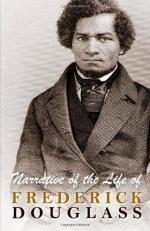We were not regularly allowanced. Our food was coarse corn meal boiled. This was called mush. It was put into a large wooden tray or trough, and set down upon the ground. The children were then called, like so many pigs, and like so many pigs they would come and devour the mush; some with oyster-shells, others with pieces of shingle, some with naked hands, and none with spoons. He that ate fastest got most; he that was strongest secured the best place; and few left the trough satisfied.
I was probably between seven and eight years old when I left Colonel Lloyd’s plantation. I left it with joy. I shall never forget the ecstasy with which I received the intelligence that my old master (Anthony) had determined to let me go to Baltimore, to live with Mr. Hugh Auld, brother to my old master’s son-in-law, Captain Thomas Auld. I received this information about three days before my departure. They were three of the happiest days I ever enjoyed. I spent the most part of all these three days in the creek, washing off the plantation scurf, and preparing myself for my departure.
The pride of appearance which this would indicate was not my own. I spent the time in washing, not so much because I wished to, but because Mrs. Lucretia had told me I must get all the dead skin off my feet and knees before I could go to Baltimore; for the people in Baltimore were very cleanly, and would laugh at me if I looked dirty. Besides, she was going to give me a pair of trousers, which I should not put on unless I got all the dirt off me. The thought of owning a pair of trousers was great indeed! It was almost a sufficient motive, not only to make me take off what would be called by pig-drovers the mange, but the skin itself. I went at it in good earnest, working for the first time with the hope of reward.
The ties that ordinarily bind children to their homes were all suspended in my case. I found no severe trial in my departure. My home was charmless; it was not home to me; on parting from it, I could not feel that I was leaving any thing which I could have enjoyed by staying. My mother was dead, my grandmother lived far off, so that I seldom saw her. I had two sisters and one brother, that lived in the same house with me; but the early separation of us from our mother had well nigh blotted the fact of our relationship from our memories. I looked for home elsewhere, and was confident of finding none which I should relish less than the one which I was leaving. If, however, I found in my new home hardship, hunger, whipping, and nakedness, I had the consolation that I should not have escaped any one of them by staying. Having already had more than a taste of them in the house of my old master, and having endured them there, I very naturally inferred my ability to endure them elsewhere, and especially at Baltimore; for I had something of the feeling about Baltimore that is expressed in the proverb, that “being hanged in England is preferable to dying a natural




